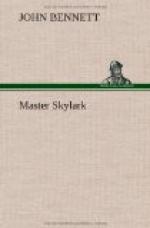“Robin Getley,” he asked at the guildschool door, “was my son wi’ thee overnight?”
“Nay, Master Attwood. Has he not come back?”
“Come back? From where?”
Robin hung his head.
“From, where?” demanded the tanner. “Come, boy!”
“From Coventry,” said Robin, knowing that the truth would out at last, anyway.
“He went to see the players, sir,” spoke up Hal Saddler, briskly, not heeding Robin’s stealthy kick. “He said he’d bide wi’ Diccon Haggard overnight; an’ he said he wished he were a master-player himself, sir, too.”
Simon Attwood, frowning blackly, hurried on. It was Nick, then, whom he had seen crossing the market-square.
Wat Raven, who swept Clopton bridge, had seen two boys go up the Warwick road. “One were thy Nick, Muster Attwood,” said he, thumping the dirt from his broom across the coping-stone, “and the other were Dawson’s Hodge.”
The angry tanner turned again into the market-place. His brows were knit, and his eyes were hot, yet his step was heavy and slow. Above all things, he hated disobedience, yet in his surly way he loved his only son; and far worse than disobedience, he hated that his son should disobey.
Astride a beam in front of Master Thompson’s house sat Roger Dawson. Simon Attwood took him by the collar none too gently.
“Here, leave be!” choked Roger, wriggling hard; but the tanner’s grip was like iron. “Wert thou in Coventry May-day?” he asked sternly.
“Nay, that I was na,” sputtered Hodge. “A plague on Coventry!”
“Do na lie to me—thou wert there wi’ my son Nicholas.”
“I was na,” snarled Hodge. “Nick Attwood threshed me in the Warrick road; an’ I be no dawg to follow at the heels o’ folks as threshes me.”
“Where be he, then?” demanded Attwood, with a sudden sinking at heart in spite of his wrath.
“How should I know? A went away wi’ a play-actoring fellow in a plum-colored cloak; and play-actoring fellow said a loved him like a’s own, and patted a’s back, and flung me hard names, like stones at a lost dawg. Now le’ me go, Muster Attwood—cross my heart, ’tis all I know!”
“Is’t Nicholas ye seek, Master Attwood?” asked Tom Carpenter, turning from his fleurs-de-lis. “Why, sir, he’s gone got famous, sir. I was in Coventry mysel’ May-day; and—why, sir, Nick was all the talk! He sang there at the Blue Boar inn-yard with the Lord High Admiral’s players, and took a part in the play; and, sir, ye’d scarce believe me, but the people went just daft to hear him sing, sir.”
Simon Attwood heard no more. He walked down High street in a daze. With hard men bitter blows strike doubly deep. He stopped before the guildhall school. The clock struck five; each iron clang seemed beating upon his heart. He raised his hand as if to shut the clangor out, and then his face grew stern and hard. “He hath gone his own wilful way,” said he, bitterly. “Let him follow it to the end.”




